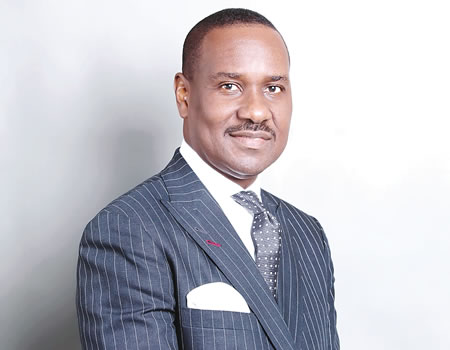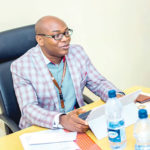How long have you been in the ministry?
I have been pastoring since 1995. I was ordained as an Assistant Pastor in 1995. Since then, I’ve been in the ministry one way or the other.
How would you describe the experience?
It has been very interesting, challenging, and educating. I have experienced the favour of God, the presence of God, the power of God, the challenges of life and the challenges of ministry.
You are a pastor, family man and chartered accountant. How do you create a balance?
I take it one day at a time. God has been gracious to me, I thank Him for everything. I don’t allow anything to weigh me down. I listen to people, do my best to help them and leave the rest to God.
Why does it seem that the church is losing its influence?
A lot of our church leaders somehow seem to have forgotten that the church actually has the possibility of having great influence over the society. A lot of them have gone into church, focusing just on the routine and the rudiments of church without realising their primary assignments of influencing and transforming the society. It is now that the church is beginning to wake up. In those days, they wanted to separate society from the church and thought that the worship of God did not have any relevance to the realities of man. But the church is beginning to change in that respect. In the past, the church dominated and controlled the society, because it came with hospitals, schools, social services, and changing the mind of the people. But over time, the church began to separate itself from the society and that has caused a lot of problems.
Is the church as passionate about lost souls as it should be?
Not sufficiently. A lot of churches are not; a lot of churches have gone into routine and just minding their own business – running the church. Some churches don’t even evangelise at all. They just wait and see whoever comes through their doors and try to retain them as members and some evangelise only to fill their churches, but not for the sake of saving souls or the lost ones. And then, there is a lot of territorialism in churches these days; there’s a lot of denominational practices which do not augur well for the practice of Christianity itself. Of course, you must make sure that you’ve been called of God into this assignment. You must be passionate about God and about the things of God. You must fear God in a very deep and wonderful way. You must want to do God’s will for the sake of God and not for an ulterior motive. It is all about service. The word, minister, actually means servant, so you must be ready to serve the people and provide services to the people and not just about your own benefits.
As a cleric, how do you think Nigeria can overcome hardship?
There are a lot of structural challenges in Nigeria but what we need to do is pray that God would give us the right type of leadership that has vision, passion and compassion for Nigerians. Not only must we pray like Nehemiah, we should also draw our sword as religious or spiritual leaders in terms of practically looking for people who fit the bill. We should also begin to train people to fit the bill. For example, Eli trained Samuel, Samuel trained Saul and Samuel trained David. When Samuel retired, Nathan took over the training and mentoring of David. So that is part of the role of spiritual leaders; to train other people for other kinds of leadership. We must perform the roles of mentoring, training, developing, encouraging, praying for, putting right, and chastising where necessary.
What advice would you give to government on security?
Security is a challenge in Nigeria and government must be practical. They must be truthful and determined to try and solve the security issues. The government doesn’t seem to have the commitment and determination to tackle security head on. We must do it; we must have the America-like attitude towards security. We must commit resources to it and find the right people within the security agencies of Nigeria to do it. We shouldn’t play politics with security; we should get it done professionally.
What’s your advice to Nigerians?
Nigerians, let’s be hopeful. Let’s not speak anything negative towards Nigeria. Let us develop the Nigerian patriotism and let us ensure that this nation survives and this nation does well. Nigeria is bigger than all of us and it has great hope. It’s a nation with a lot of resources that can become truly outstanding if we commit ourselves to it.
Another thing I want to say also is that in Nigeria, we need a lot of education, information and enlightenment for the general public. One of the problems with Nigerians is that people are not well-informed; they’re not educated or enlightened. Many people cannot distinguish good from bad, right from wrong. So, there must be education, information and orientation on life, ethics, morality, knowing what their rights are and insisting on their rights.
The reason we don’t have good governance in the country is that a lot of Nigerians don’t know good from bad; they don’t understand the importance of governance, they don’t understand what government does. Most people don’t know who their councillors are, they don’t know who their local government chairmen are. It is one month or so to election that governorship candidates emerge and people just vote for them anyhow. In other countries, people know who they want to vote for; people investigate the background of who they want to vote for. People who are running for elective offices have a track record that people can point to and can say that we know this fellow. People know what is good from what is bad. In Nigeria, we are almost losing our sense of value and ethical conscience and this is what we need to do to re-orientate Nigerians. We need to let Nigerians know that they have a voice, their votes count and they can hold their leaders accountable. Right now, leaders do anything; they’re not accountable we need to pull them back and hold them accountable.
What are some challenges of the ministry?
Every venture has its challenges; the challenge of having a clear vision, the challenge of human resources, the challenge of other resources and environmental challenges. Not many institutions, including the church, have enough resources to do what they want to do. So, everybody is competing for resources and then sometimes the environment itself is hostile in terms of government policies, people’s attitude, societal practices, and competing influences over people. Those are normal challenges that we all have to face.
As the Senior Pastor of Trinity House, what are the challenges you face?
Well, most of the challenges one has to face fall within the bracket of those I have described. Starting the church, we had to start by faith, and there were not enough resources, but usually in the work of God, you don’t start with everything being on ground. You start with what you have and you grow it. We’ve also had the challenge of making sure we have the right team, making sure that people are committed and passionate, among others. Those were the fundamental challenges that we faced. But everybody knows that Nigeria is a very challenging environment. Also, people are sometimes hostile to the worship of God and then sometimes, that can work against these things.
Be that as it may, Nigerians are also very religious and they like to worship and look for God, be it for their own personal benefit or for the genuine love of God.






